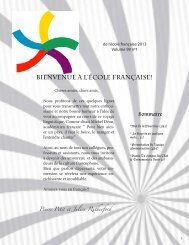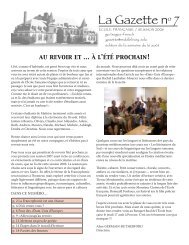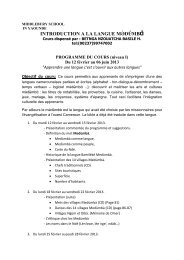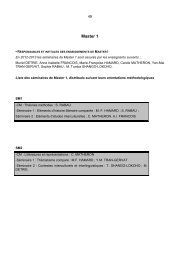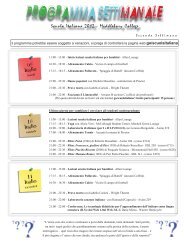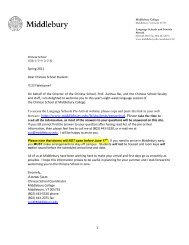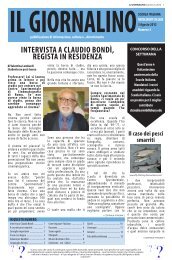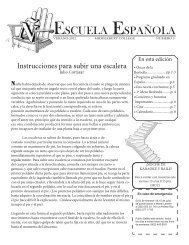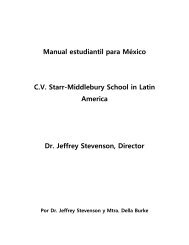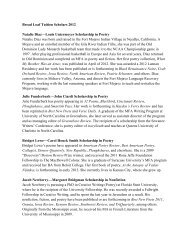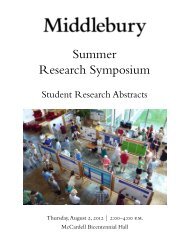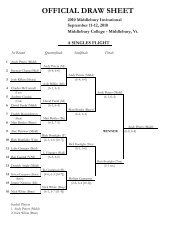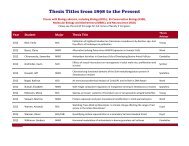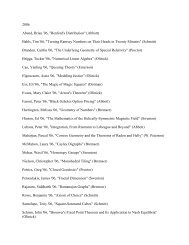2010 Catalog - Middlebury College
2010 Catalog - Middlebury College
2010 Catalog - Middlebury College
Create successful ePaper yourself
Turn your PDF publications into a flip-book with our unique Google optimized e-Paper software.
VERMONT<br />
Group IV (American Literature)<br />
7515b Identities in Nineteenth-Century American Literature<br />
Mr. Nash/M–F 11:15–12:15<br />
This course turns on the fundamental questions of how nineteenthcentury<br />
writers both chronicle and help create the processes by which<br />
Americans articulate various types of identity, from the personal to the<br />
communal to the national. In pursuit of some answers, we will read the<br />
following primary texts in the order listed below.<br />
Texts: Ralph Waldo Emerson, “The American Scholar,” “The<br />
Divinity School Address,” “Fate,” and “Experience”; Henry David<br />
Thoreau, “Civil Disobedience,” “Slavery in Massachusetts,” “A Plea<br />
for Captain John Brown”; Frederick Douglass, Narrative of the Life<br />
of Frederick Douglass, an American Slave, Written by Himself; Nathaniel<br />
Hawthorne, The Scarlet Letter; Herman Melville, Moby-Dick; selected<br />
poems by Walt Whitman and Emily Dickinson; Mark Twain,<br />
Adventures of Huckleberry Finn (California). Please note: You should<br />
buy the University of California Press reissue of Hucklebury Finn (it has<br />
illustrations), but you may use any editions of the other texts. Copies<br />
of the Whitman and Dickinson poems will be part of a substantial<br />
packet of secondary readings to be assigned in Vermont. Students are<br />
strongly encouraged to acquire a working knowledge of nineteenthcentury<br />
American history prior to the start of the course; I recommend<br />
Daniel Walker Howe’s What God Hath Wrought (Oxford), James M.<br />
McPherson’s Battle Cry of Freedom (Oxford), and Rebecca Edwards’s<br />
New Spirits: America in the Gilded Age, 1865–1905 (Oxford) as starting<br />
points.<br />
7588 Modernist American Literature/Ms. Hungerford<br />
M–F 10–11<br />
This course will examine the literary innovations of the early twentieth<br />
century, focusing on modernist American writers. Reading poetry and<br />
fiction from this fertile period, we will also explore the contexts—<br />
aesthetic, cultural, biographical, and historical—for the formal and<br />
thematic questions that drive the work of these writers. Our study<br />
of more familiar texts will reveal how interpretations of modernist<br />
literature have changed with shifting scholarly and popular perceptions<br />
of the period. Students will prepare one short and one longer paper and<br />
a presentation. The pace is brisk, so please prepare the James, and read a<br />
bit of the denser material (especially Stevens, Stein, and Crane) a<br />
first time before arriving in Vermont.<br />
Texts: Henry James, The Turn of the Screw (Dover Thrift); Gertrude<br />
Stein, Three Lives and Tender Buttons (Digireads.com); Robert Frost,<br />
A Boy’s Will and North of Boston (Dover Thrift); Jean Toomer, Cane<br />
(Liveright); T.S. Eliot, The Waste Land, ed. Lawrence Rainey, annotated<br />
2nd ed. (Yale); Wallace Stevens, The Collected Poems (Vintage);<br />
Ernest Hemingway, In Our Time (Scribner); F. Scott Fitzgerald, The<br />
Great Gatsby (Scribner); Langston Hughes, Collected Poems (Vintage);<br />
Nella Larsen, Quicksand and Passing (Rutgers); William Faulkner, As I<br />
Lay Dying (Vintage); Hart Crane, The Bridge (Liveright). A packet of<br />
required supplemental readings will be available in Vermont.<br />
7625 Religion and the Twentieth-Century American Novel<br />
Ms. Hungerford/M–F 8:45–9:45<br />
Beginning with Harold Frederic’s realist masterpiece The Damnation of<br />
Theron Ware (1896) and ending with the apocalyptic fiction of Cormac<br />
McCarthy (The Road [2006]), we will study a century’s worth of<br />
American novels for which religion is central to theme and narrative<br />
form. Our questions will include: How is literature imagined in<br />
religious terms? How does American religious history inflect the<br />
development of the American novel in the twentieth century? How<br />
is the Bible folded into fiction? How do Catholic and Jewish thought<br />
emerge in Protestant America? How is religious life imagined in the<br />
context of American pluralism? The course requires one short paper,<br />
one longer paper, and student presentations. The seminar will include<br />
brief introductions to a few authors not on the syllabus (Henry James,<br />
Flannery O’Connor, Jack Kerouac, Toni Morrison, Don DeLillo) to<br />
broaden the context and as a resource for further study.<br />
30<br />
Texts: Harold Frederic, The Damnation of Theron Ware, or Illumination<br />
(Penguin); William Faulkner, Light in August (Vintage); James Baldwin,<br />
Go Tell it on the Mountain (Dial); Saul Bellow, Seize the Day (Penguin);<br />
J.D. Salinger, Franny and Zooey (Back Bay); Thomas Pynchon, The<br />
Crying of Lot 49 (HarperPerennial); Marilynne Robinson, Housekeeping<br />
(Picador); Cormac McCarthy, The Road (Vintage). A course reader<br />
including William James, Philip Roth, material from the Baldwin<br />
archive at Yale, and other prose and criticism will be available in<br />
Vermont. Please read Theron Ware and as much as possible of Light in<br />
August before you arrive.<br />
7638 African American Literature since 1940/Mr. Nash<br />
M–F 8:45–9:45<br />
This course provides an aesthetic/cultural-historical examination of<br />
representative twentieth-century African American narratives. We<br />
will discuss developments in African American literary culture such as<br />
social realism, universalism, the Black Arts Movement, and the New<br />
Black Aesthetic. We will supplement our reading of fiction with<br />
considerations of visual art, music, and film.<br />
Texts: Richard Wright, Native Son (HarperPerennial); Ann Petry,<br />
The Street (Mariner); Ralph Ellison, Invisible Man (Vintage); James<br />
Baldwin, Go Tell It on the Mountain (Dell); Toni Morrison, The Bluest<br />
Eye (Penguin); August Wilson, The Piano Lesson (Plume); Ernest J.<br />
Gaines, A Lesson before Dying (Vintage); Charles Johnson, Dreamer<br />
(Scribner). Students are strongly encouraged to acquire a working<br />
knowledge of African American history prior to the start of the course;<br />
I recommend Darlene Clark Hine, The African American Odyssey<br />
(Prentice Hall, 4th ed.).<br />
7650b The Contemporary American Short Story<br />
Mr. Huddle/M–F 8:45–9:45<br />
Among the considerations of this discussion-oriented class will be<br />
strengths and weaknesses of stories, collections, and authors from<br />
1985 to the present. Along with speculating about what contemporary<br />
fiction can tell us about contemporary culture, we will address specific<br />
curriculum issues as they apply to the contemporary short story and the<br />
general topic of literary evaluation. Students will be asked to give brief<br />
class presentations.<br />
Texts: Tobias Wolff, Our Story Begins: New and Selected Stories (Vintage);<br />
Jhumpa Lahiri, Unaccustomed Earth (Vintage); Edwidge Danticat, The<br />
Dew Breaker (Vintage); Ben Fountain, Brief Encounters with Che Guevara<br />
(HarperPerennial); Greg Bottoms, Fight Scenes (Counterpoint); Lydia<br />
Peelle, Reasons for and Advantages of Breathing (HarperPerennial); Maile<br />
Meloy, Both Ways Is the Only Way I Want It (Riverhead); Tracy Winn,<br />
Mrs. Somebody Somebody (Southern Methodist; a Random House paperback<br />
edition is expected in early June); Lan Samantha Chang, Hunger<br />
(Norton); Elizabeth Strout, Olive Kitteridge (Random).



